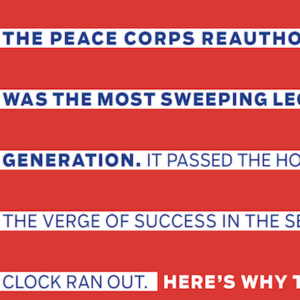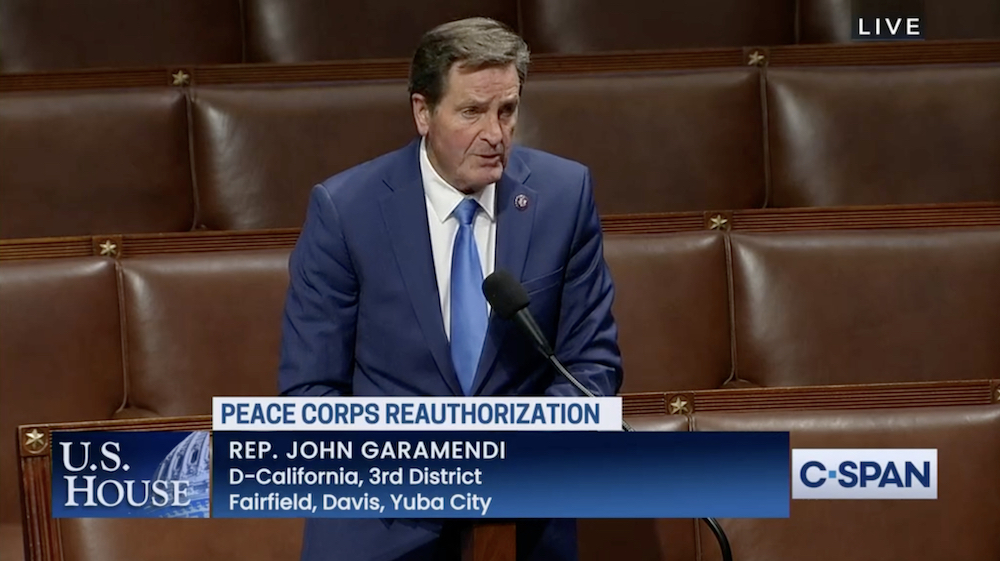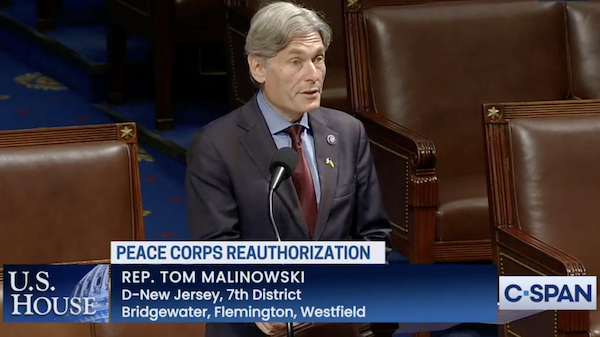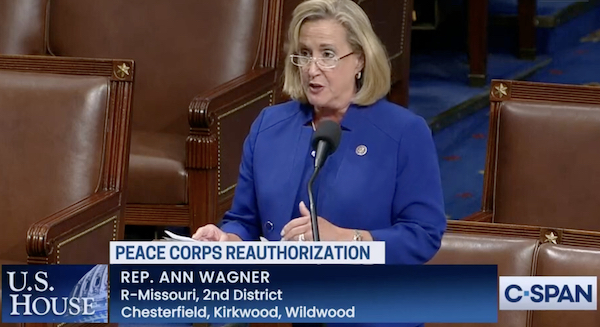 The Peace Corps Reauthorization Act was the most sweeping legislation in a generation. It passed the House and was on the verge of success in the Senate when the clock ran out. Here’s why that matters.
The Peace Corps Reauthorization Act was the most sweeping legislation in a generation. It passed the House and was on the verge of success in the Senate when the clock ran out. Here’s why that matters.
By Jonathan Pearson, Joel Rubin, and Steven Boyd Saum
Just as Peace Corps Volunteers began returning to service overseas in 2022, legislation moved forward in Congress that was meant to bolster a renewed, revitalized, and reshaped Peace Corps. In the House, the Peace Corps Reauthorization Act (H.R. 1456) was introduced by RPCV Rep. John Garamendi (D-CA) and Rep. Garret Graves (R-LA). It won a historic victory in September 2022, with two thirds of the House voting for it.
The Senate version of the legislation (S. 4466) had strong backing from Foreign Relations Committee Chairman Robert Menendez (D-NJ) and Ranking Member James Risch (R-ID). It won unanimous support from the committee in July 2022 and garnered co-sponsorship of a bipartisan group of 15 senators. But as fall wore on, midterm elections sucked up political oxygen. There were efforts to water down the bill. And as the legislative clock ran down in December, a final push to get the legislation over the line was thwarted by Sen. Rand Paul (R-KY), who put a hold on the bill and prevented it from being passed by unanimous consent — a simple voice vote — despite strong Republican backing.
Some good news for the Peace Corps community: The Senate did confirm Carol Spahn as Peace Corps Director — by unanimous consent, we’ll note — in November. And, as part of the $1.7 trillion Fiscal Year 2023 omnibus spending package passed by Congress just before Christmas, the Peace Corps budget now has its first increase in seven years: from the flat $410.5 million that had held for the past six years to $430.5 million.
An increased budget was also part of the Peace Corps Reauthorization Act. Here’s a quick recap of some other key elements in House or Senate versions — or both — that now languish:
- Increase the Volunteer readjustment allowance to $375 minimum/month
- Suspend federal student loan interest for the duration of service
- Extend transitory health care coverage for returned Volunteers
- Provide greater whistleblower protections; codify two years of non-competitive eligibility (NCE) for returned Volunteers
- Strengthen DEIA efforts; expand Peace Corps eligibility to include U.S. citizens who are American Samoan; increase workers compensation for Volunteers injured while serving
- Enable the director to suspend Peace Corps staff without pay in the event of serious misbehavior.
This chapter in Peace Corps legislation is a story of victories that were — and that might have been. This is also the time to ask: How can we use the work done so far to provide a foundation for new efforts in 2023?
VICTORY IN THE HOUSE
On Monday, September 19, the Peace Corps Reauthorization Act was brought to the full House for a vote. In order to pass without possible further changes or amendments — under suspension of the rules, as the process is known — the bill needed to secure a bipartisan two-thirds majority vote. Before the voting began, several members of Congress made the case for the bill — most notably its author. Excerpts.
“I can think of no better way to honor JFK’s vision than for this Congress to pass the bipartisan Peace Corps Reauthorization Act and advance the Peace Corps into the 21st century.” John Garamendi speaking on behalf of the Peace Corps Reauthorization Act on September 19. C-SPAN screenshot.
John Garamendi (D-CA)
RPCV Ethiopia (1966–68) and co-author of H.R. 1456
My wife Patty and I began our careers in public service when we joined the Peace Corps as young married graduates fresh out of U.C. Berkeley. Our post was to a remote village in western Ethiopia. We taught the seventh and eighth grades and engaged in community development. Like so many Americans of every age and background, we answered JFK’s call to service … More than 240,000 Americans have served in 143 countries.
Their tasks were to assist in the economic and social development in those countries … teaching, providing medical education and health care services … creating cooperatives … building roads … When the Soviet Union collapsed, Peace Corps Volunteers were asked by 13 newly independent states to come and bring the best of America with them. Americans young and old, with every skill arrived. Since 1992, 3,552 American Peace Corps volunteers have served in Ukraine.
Prior to the global COVID-19 pandemic, Peace Corps Volunteers served in 61 countries … Today, the Peace Corps is diligently returning its Volunteers to this essential work … My bill, the bipartisan Peace Corps Reauthorization Act of 2021, builds upon the Sam Farr–Nick Castle Peace Corps Reform Act of 2018 and the Kate Puzey Peace Corps Volunteer Protection Act of 2011. It does make many important reforms … This current critical legislation will reinvigorate the Peace Corps, and I’m sure that its essential work can continue to shape and inspire people around the world for years to come.
In 1961, President Kennedy understood that the Peace Corps would “permit our people to exercise more fully their responsibilities in the great common cause of world peace” … I can think of no better way to honor JFK’s vision than for this Congress to pass the bipartisan Peace Corps Reauthorization Act and advance the Peace Corps into the 21st century.
Tom Malinowski (D-NJ)
Vice Chair, House Foreign Affairs Committee
After 61 years of success, we think it’s time to further strengthen the Peace Corps’ global mission by providing additional resources to better the agency and to support its Volunteers. Congress last authorized the Peace Corps in 1999. For this reason, the bill is timely, provides a much needed update to benefits for Volunteers that include readjustment allowance, re-enrollment priority, transition assistance, health insurance, non-competitive eligibility for federal employment, and updated workers’ compensation …
The bill will enhance the ability of the Peace Corps to make strong and strategic investments to meet the challenges of today and continue to be a transformative force for years to come.
Ann Wagner (R-MO)
Vice Chair, House Foreign Affairs Committee
The Peace Corps faced many challenges during the pandemic, but I am pleased that Volunteers are finally returning to their important tasks overseas. As they return, Volunteers’ safety must continue to be the agency’s top priority. Tragically, the number of Volunteers reporting sexual assault during their service has risen. This is devastating, and we must continue to hold the Peace Corps accountable for maximizing the safety and welfare of our Volunteers. This bill reinforces and builds on key reforms made by Congress in 2011, including extending the mandate of the Sexual Assault Advisory Council … This bill is an important step toward exercising our oversight responsibilities and driving reforms that will protect the Peace Corps Volunteers that we all represent.
WHEN THE VOTES were tallied the evening of September 19, victory was clear: The most sweeping Peace Corps legislation in a generation passed the House 290–125. Seventy-nine Republicans joined all Democrats who were present for a show of bipartisan support.
For NPCA it was also a moment to thank, as Interim President and CEO Dan Baker did, longtime champions John Garamendi and Garret Graves — and to acknowledge the important role of House Foreign Affairs Committee Chair Gregory Meeks (D-NY) and Ranking Member Mike McCaul (R-TX), as well as Vice Chairs Tom Malinowski and Ann Wagner. Their strong commitment to a reformed and revitalized Peace Corps made a difference.
BRING THE FIRST GOAL INTO THE 21st CENTURY
When the Peace Corps Act was signed into law in September 1961, it established as the First Goal for the Peace Corps:
“To help the people of interested countries in meeting their need for trained men and women.”
To guide the work of the agency in the 21st century, the reauthorization legislation proposed updating that to:
“To partner with the people of interested countries in meeting their need for trained individuals.”
SENATE CHAMPIONS
In July 2022, the Senate version of the Peace Corps Reauthorization Act (S. 4466) was passed unanimously by the Foreign Relations Committee. “This once-in-a-generation bill implements necessary reforms to make certain the Peace Corps has what is required to meet the needs of its Volunteers around the world,” said Chair Robert Menendez.
Ranking Member James Risch lauded “bipartisan effort to reauthorize the Peace Corps for the first time in over a decade and to provide necessary reforms to improve the safety and security of Volunteers as they reenter the field.”
“This once-in-a-generation bill implements necessary reforms to make certain the Peace Corps has what is required to meet the needs of its Volunteers around the world.”
—Robert Menendez, Chair, Senate Foreign Relations Committee
TEN FORMER PEACE CORPS DIRECTORS CALL ON THE SENATE TO PASS THE LEGISLATION
On October 3, in a bipartisan show of support, ten former Peace Corps Directors who served under Republican and Democratic administrations alike sent a letter to Senate Majority Leader Chuck Schumer (D-NY) and Senate Minority Leader Mitch McConnell (R-KY), calling on them to pass the Peace Corps Reauthorization Act (S. 4466).
These bipartisan former Peace Corps Directors specifically asked the Senate to move the legislation, co-authored by Senate Foreign Relations Committee (SFRC) Chairman Robert Menendez (D-NJ) and Ranking Member James Risch (R-ID), either as an amendment to the pending National Defense Authorization Act for Fiscal Year 2023 (NDAA) or independently.
The letter was also shared with key senators who have a decision-making role in this process. They were Senator Robert Menendez (D-NJ), Chair, Foreign Relations Committee; Senator James Risch (D-ID), Ranking Member, Foreign Relations Committee; Senator Patty Murray (D-WA), Chair, Health, Education, Labor, and Pensions Committee; Senator Richard Burr (R-NC), Ranking Member, Health, Education, Labor, and Pensions Committee; Senator Jack Reed (D-RI), Chair, Armed Services Committee; Senator James Inhofe (R-OK), Ranking Member, Armed Services Committee; Senator Gary Peters (D-MI), Chair, Homeland Security and Government Affairs Committee; and Senator Rob Portman (R-OH), Ranking Member, Homeland Security and Government Affairs Committee.
As the directors noted, the legislation had already unanimously passed the Senate Foreign Relations Committee. Its House of Representatives companion legislation (H.R. 1456), authored by Representatives John Garamendi (D-CA) and Garret Graves (R-LA), passed the full House on September 19 with a strong bipartisan vote of. The Senate legislation had 15 co-sponsors, including six Republicans.
The former Directors wrote this letter when they did, at a time that amendments to be considered for the FY23 NDAA were being vetted, with floor votes likely to occur after the midterm elections.
CITIZEN ADVOCATES
Advocacy efforts by members of the Peace Corps community, including those led by National Peace Corps Association, were instrumental in making the legislation possible. The Peace Corps Connect to the Future town halls, summit, and report provided a road map for the agency, Congress, and more. Focusing on the legislation, thousands of citizen advocates around the country — with guidance, tools, and encouragement from the NPCA advocacy team — organized meetings, wrote to lawmakers, submitted opinion pieces and letters to the editor, and engaged others in these efforts. Individuals sent more than 20,000 messages sent to Congress and President Biden. In a final push in December, 89 NPCA affiliate groups signed onto a letter urging the Senate to pass the legislation.
We Americans take care of our veterans, diplomats, and others who suffer harm during their overseas service, as we should. Those who served honorably in the Peace Corps deserve similar consideration.
—David Jarmul (Nepal 1977–79, Moldova 2016–18) in the Winston-Salem Journal
We have a growing list of bipartisan co-sponsors on the Peace Corps Reauthorization Act. We’re so close to the finish line. This is why what we do right now matters.
—Valerie Young (Tonga 2005–07), advocacy coordinator for the Maine Peace Corps Association, in a video she made for Peace Corps Connect 2022
I just finished orientation to serve in Peace Corps South Africa as an HIV community health coordinator. I truly believe in the mission of the Peace Corps—and the process and experience it gives people. Many of the questions that came up during orientation for fellow Volunteers are things included in the Peace Corps Reauthorization Act: How is the Peace Corps funded? What kind of benefits are afforded to people with the Peace Corps? How are people who served in the Peace Corps treated with dignity and respect after service?
—Emilio Bloch, Copley, Ohio, in a video he recorded advocating for the Senate to pass the Peace Corps Reauthorization Act
FRAMEWORK FOR THE FUTURE
Despite tremendous progress in the House and Senate, and hard-fought negotiations up until the closing hours of the 117th Congress in December, passage of the Peace Corps Reauthorization Act in the Senate fell short. We should be celebrating the return of Volunteers to service. But through their actions — watering down the bill and blocking it — several members of Congress demonstrated a lack of respect for that service, and for the value Volunteers provide for the U.S. and partner countries around the world.
Consequences are already being felt. The congressionally established Sexual Assault Advisory Council is scheduled to expire in 2023. The director doesn’t have tools she should for dealing with staff charged with serious misconduct. There’s no expansion of non-competitive eligibility for returning Volunteers. Efforts to address equity and affordability for Volunteers in need of menstrual hygiene products have been thwarted.
Commitment from our community has contributed significantly to a revival of the Peace Corps. In 2022 it led the House to pass key legislation, and it led the Senate to approve a new director and resources to support Volunteers and strengthen programs. As we turn our attention to work in 2023 — including our annual National Days of Advocacy in March and April — we have a framework for action from which to build upon.
Jonathan Pearson is director of advocacy for NPCA. Joel Rubin led the steering committee for the Peace Corps Connect to the Future report and served as vice president for global policy and public affairs for NPCA. Steven Boyd Saum served as editor of WorldView.



